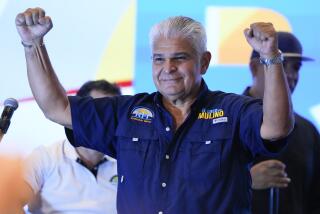An Uncertain Road for Spain : Goals of new prime minister--and the electorate--are hazy
- Share via
The polls said Spain wanted change, and last week Spaniards elected a new prime minister. The question now is what kind of change will Jose Maria Aznar, a conservative, deliver? Will it be what the country needs?
There is a possibility that the voters removed Felipe Gonzalez, a former labor leader whose Socialist government had ruled for 13 years, simply because they were tired of him. Even for a charismatic politician with a flair for flashy oratory, 13 years in power is too long.
In matters of substance, policies and programs, the campaign did not delineate what changes the electorate or the candidates wanted. Both the Conservative and the Socialist camps claimed they were fighting for the center of the political spectrum. Winning the center is hardly a recipe for change.
Furthermore, the margin of victory gained by Aznar’s right-wing Popular Party, linked to political forces once associated with dictator Francisco Franco, won’t give the incoming prime minister the political leverage to implement radical change. His party finished 20 seats short of a parliamentary majority and will have to work out a coalition with one of the smaller parties.
By most standards, Socialist rule under Gonzalez was both a Spanish and European success story. Democracy, still fragile when he came to power, was consolidated, and he energetically transformed a provincial, largely backward country hidden behind the Pyrenees into a dynamic society seriously engaged in a free market economy and with a role to play in the European Union.
But the success story went only so far. Not only were there corruption scandals under Socialist rule but also serious accusations that some of Gonzalez’s collaborators had ordered the assassinations of Basque terrorists.
In the economic realm, Gonzalez’s legacy is mixed. The accomplishments are many: Spain’s economy is now growing at a 3% rate and inflation has been kept at 4%; the peseta is one of the strongest currencies in Europe, and there is a steady flow of foreign investment. But Gonzalez abandoned his economic liberalization program half-way through his tenure and leaves Aznar a high rate of unemployment, a pension system blown out of proportion, inefficient state industries that need to be privatized, a mess of a tax system and a still simmering problem with the Basques.
Spaniards have got their desired change in the prime minister’s chair. But do they have the leader and the party to keep their country on the rise? That’s the challenge for Jose Maria Aznar. Aznar: After 13 years, a new leader.
More to Read
Sign up for Essential California
The most important California stories and recommendations in your inbox every morning.
You may occasionally receive promotional content from the Los Angeles Times.













